|
|
|
Sort Order |
|
|
|
Items / Page
|
|
|
|
|
|
|
| Srl | Item |
| 1 |
ID:
155375
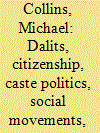

|
|
|
|
|
| Summary/Abstract |
This article examines the development and early politics of the Dalit Panther Iyakkam (DPI), or Dalit Panther Movement, of Tamil Nadu, India. Established in 1982, the DPI advanced a political programme that petitioned state authorities qua democratic citizens. By submitting written appeals through formal institutional channels, DPI organisers lobbied officials to perform their professional duties and advocated the delivery of rights, impartial administration of law, and equitable access to social and economic development. This article explores the initial phase of Dalit Panther politics in Tamil Nadu through its own documentary evidence, drawing upon DPI Chairman A. Malaichamy’s personal letters, written appeals, and received correspondence, as well as original pamphlets and handbills distributed at political rallies. Countering interpretations of Dalit assertion that accentuate ‘illiberal’ techniques as its natural form and state welfare as its principle target, the article shows that legal advocacy served as an integral feature of early DPI politics. But, when state institutions proved unresponsive and the movement developed a grassroots presence, DPI activists expanded their programme to encompass contentious street politics as a complementary means to make claims on state authority, amplify their voices to centres of power, and demand recognition as democratic citizens.
|
|
|
|
|
|
|
|
|
|
|
|
|
|
|
|
| 2 |
ID:
180052
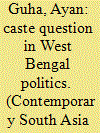

|
|
|
|
|
| Summary/Abstract |
The electoral decline of the organised Left in West Bengal politics has given rise to intellectual speculation about the increasing possibility of caste politics. In this context, this article investigates whether there is any merit in the claim that the electoral decline of the Left Front has paved the way for the rise of caste at the centre stage of mainstream electoral politics in West Bengal. It asks whether lower castes have started to mobilise politically in West Bengal in the same way as in many other states. The article argues against the claim of ‘a new politics of caste’ in West Bengal by showing that the electoral decline of the Left Front has not been accompanied by any rise in lower caste representation. In this context, the article also attempts to understand the reasons for the continuing non-politicisation of caste in West Bengal, revealing many factors relating to demography and political economy which don’t augur well for caste politics in West Bengal.
|
|
|
|
|
|
|
|
|
|
|
|
|
|
|
|
| 3 |
ID:
187738
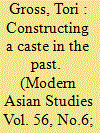

|
|
|
|
|
| Summary/Abstract |
This article examines the recent political history of the Devendrakula Vellalars (henceforth, Devendras). Officially recognized by the state and union governments in 2020 and 2021, this novel consolidated caste formation includes a broad range of formerly endogamous ‘Untouchable’ communities spread throughout Tamil Nadu but most highly concentrated in its southern half. I argue that the communities constituting the Devendras have been socio-economically diverse for at least the past century and thus do not necessarily share the same political priorities. They have, nonetheless, attempted to unite in opposition to the politically powerful Thevars (Other Backward Class or OBC) who are themselves a consolidated caste formation that grew out of colonial domination. The Devendras's economic diversity has, however, troubled their oppositional political consolidation, compelling the production of revisionist mythico-histories that appeal to widely held desires for authority and honour. Disavowing the Dalit past and recasting the Devendras as the descendants of heroes, such mythico-histories produce a collective identity characterized by the ideals of righteous self-sacrifice, valour, and agrarian civility. Devendras's identarian claims are, however, reliant on the acceptance of internal and external audiences, some of which violently oppose their assertions. They nevertheless seek recognition, and in so doing empower themselves by gathering strength in numbers.
|
|
|
|
|
|
|
|
|
|
|
|
|
|
|
|
| 4 |
ID:
195219


|
|
|
|
|
| Summary/Abstract |
This study engages with debates on Tamil populism using insights from the field. The initial theorists of Tamil populism characterised it broadly into two — assertive populism propagated by the Dravida Munnetra Kazhagam (DMK), and paternalist populism promulgated by the All-India Anna Dravida Munnetra Kazhagam (AIADMK). However, recent scholarship has strongly opposed this characterisation, arguing that Tamil populism approximates left populism. With these confounding views as the backdrop, we argue, through field insights, that one cannot discount the formulation of Tamil populism along assertive/paternalist lines. Secondly, we contest the recent formulation that the Dravidian Model approximates left populism.
|
|
|
|
|
|
|
|
|
|
|
|
|
|
|
|
| 5 |
ID:
161152
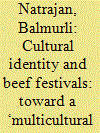

|
|
|
|
|
| Summary/Abstract |
Beef festivals are a dramatic and visible form of protest against the Indian government's ban on beef. These festivals are framed popularly as an assertion of Dalit ‘cultural rights’ and identity, with beef represented as the cultural food of Dalits. While it is clear that the beef ban is a casteist ban based on a Brahmanical food hierarchy, this paper explores the limits of resisting casteism through the assertion of caste-based cultural rights and identities, or as an assertion of an individual right to food choice. It argues that such a politics of resisting casteism runs into problems of the culturalization of caste, and limits the kinds of radical Dalit subjects and actors who could emerge as liberatory political subjects. The paper calls for reframing beef festivals as ‘antagonistic’ moments that articulate the degradation of Dalit labor in the politics of beef, reassert Dalit identity as an anti-caste identity rather than a cultural caste identity, and herald a politics of ‘multiculturalism against caste’.
|
|
|
|
|
|
|
|
|
|
|
|
|
|
|
|
| 6 |
ID:
119969
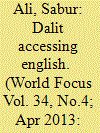

|
|
|
| 7 |
ID:
162460
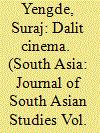

|
|
|
|
|
| Summary/Abstract |
This article offers introductory remarks on the position of the Dalit in Indian cinema. It starts with the observation that the Indian film industry is an inherently caste-based, biased, mechanised product of technological industrialisation in which Dalit inclusion is not a moral concern. The mainstream film industry in India delivers the desires and principles of market and society by excluding a Dalit framework outright—a problem now being addressed by the entry of an explicitly Dalit cinema. By briefly looking at two films, Fandry (2013) and Sairat (2016), both written and directed by Dalit film-maker Nagraj Manjule, I offer a critical reading of ‘Dalit Cinema’. Taking the work of Manjule, a maverick film-maker who is establishing a new discourse of Dalit-centred socio-culturism, I demonstrate the extent to which caste narratives are absent in the Indian film industry.
|
|
|
|
|
|
|
|
|
|
|
|
|
|
|
|
| 8 |
ID:
148514
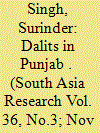

|
|
|
|
|
| Summary/Abstract |
Rising cultural consciousness among Dalits in Punjab underpins recent endeavours to construct a distinct identity and cultural heritage. The article examines how this renovation of identity and culture, centred on claiming and gaining social esteem and self-respect, is visibly expressed in heritage construction, with important support through transnational diasporic connections. This article shows specifically how monetary and ideational inputs for construction of two Ad Dharmi jathera shrines have created an impressive monumental heritage that promotes and reflects rising cultural confidence among the Dalits in Punjab and generates enthusiasm in the whole community. This provides them assurances of a more respectable life, both at home and abroad, yet also introduces new divisions and diversities.
|
|
|
|
|
|
|
|
|
|
|
|
|
|
|
|
| 9 |
ID:
195198


|
|
|
|
|
| Summary/Abstract |
Shilpa Raj’s memoir The Elephant Chaser’s Daughter (2017) and Yashica Dutt’s Coming Out as a Dalit: A Memoir (2019) map a specific kind of individual trauma, along with the cultural trauma that is found in other Dalit life writings. Both the narratives begin with the death of another Dalit individual whom the memoirists consider as a sibling/comrade who lacked the partial ‘privilege’ they enjoyed and the narratives can be read as negotiating this survivor’s guilt. Hence, these life writings are part elegies and part literature of protest. They are also part of biographies, for while the writer’s life story is one centre, these writings also have another centre – the real/imagined life of the dead person. As the writers compare and contrast their different destinies, we argue that these narratives (1) lay bare the complexities and limits of Dalit emancipation in modern India where the caste question has been seemingly resolved (2) call for an extension of the intersectional framework to analyse the concept of ‘partial privilege’ in Dalit life-writing.
|
|
|
|
|
|
|
|
|
|
|
|
|
|
|
|
| 10 |
ID:
170477
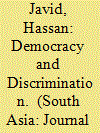

|
|
|
|
|
| Summary/Abstract |
Drawing on fieldwork conducted in Indian and Pakistani Punjab, this paper focuses on how, despite membership in or conversion to majority religious communities, former untouchables in both countries continue to experience caste-based discrimination. In India, a rights-based idiom for caste politics is limited by fragmentation within the Dalit community and the compromises required by electoral politics, while the imposition of a totalising Islamic identity by the state has resulted in the erasure of caste from the political discourse in Pakistan. This paper suggests that class-based mobilisation may be a better route to Dalit empowerment on both sides of the border.
|
|
|
|
|
|
|
|
|
|
|
|
|
|
|
|
| 11 |
ID:
131613
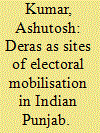

|
|
|
|
|
| Publication |
2014.
|
| Summary/Abstract |
Mushrooming of the deras in Indian Punjab, and the role of some of these deras in influencing the political choices of their followers, most of whom belong to the socially and economically marginal groups, is being recognised and apparently encouraged by the political parties. This is evident in the fact that political leaders/candidates cutting across party divides flocked to various deras in the run-up to the recent elections. This phenomenon can be attributed primarily to the fact that the social basis of political power of state has remained unaltered in favour of the upper castes/communities. Unwilling to share power, yet compelled to seek the crucial support of numerically strong and economically mobile dalit and other backward castes voters in a closely contested bi-polar polity, the upper-caste political leadership takes recourse to the 'softer' option of cultivating the deras to 'deliver' en bloc the marginal-castes votes. With one form of the identity politics based on ethno-regional communal divide having receded to background, it is the turn of the caste-based identity politics through the 'dera route' that is prevailing in post-militancy Punjab.
|
|
|
|
|
|
|
|
|
|
|
|
|
|
|
|
| 12 |
ID:
130808
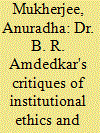

|
|
|
|
|
| Publication |
2014.
|
| Summary/Abstract |
Ethics and morality are the milestones of civilization in the true sense of the term. These concepts again are not static but evolve with greater implications and subtler nuances as humanity strives to grow towards perfection- the ultimate end of existence. ' whether biologically or spiritually. In the context of Indian thought, the traditional, age-old dictums of ethics and morality. having undergone numerous interpretations and changes have experienced a new set of values,' however latent in the traditional interpretation of Dharma or Niri- with the advent of" nationalism, the emergence of a new nation-state and the concurrent vision of human rights. The Constitution of India fully recognizes the moral as at par with the modem, that is, the western ideals of morality in the realization that in the context of Dalit uprising in modern India, the traditional ideals of ethics and morality are to be reviewed. Obviously this shows that what is legal should be ethical and moral or rather. what is ethical and moral tnust have its place in law. It is from this perspective that the modern-day Dalit struggle against injustices, age-old as they are. are to be seen and Dr.B.R. Ambedkar's initiation to this struggle was aimed at bringing ethics and morality to work at the state level, subjugating the Nili forest while lawgivers to take a backseat before the universal laws of morality. To understand Ambedkar's stand on the place of ethics and morality in Hinduism, one must see the reasons that made him strike out at the roots of Hindu social ethics. The Hindu social life was traditionally ruled by Dilemma. Dharma guided a Hindu's'Iife from birth to death by a set of rules strictly laid out for everyone in society. The observation of these rules was morality and the underlying ethics of these duties and rights was ?rst ofall, societal good, i.e., good for 'all. The second part of this ethics was that by observing this social morality, an individual will attain perfection. In accordance with these concepts, the Dharmas/zastras dictate the functions ofthe state and the king. The Nili and Dandanili emanate from one source and with one ideal- that is to maintain the social order by arranging for the speci?c duties of each and every member of society. Consequently. rights came as group rights and institutional rights as laid out in the Dharamshastra'. And over and above everything was the belief in the law of Karma that sanctified the rule of l/Z7I'l7aS/1I'uII7(l, or ones station in life as prescribed by onc's birth. These two essential features of Hindu society made it a highly stratified one so that the passage of' centuries only tightened the rules and the rituals pertaining to these two rules. The solemn and noble hymns of Rigveda. where the philosophy of Vedic seers and poets as the world being one and where everyone was the other's kin. I Va.t'zzdlmibu Kzzrumba/(um )' is the spirit of the ancient Indian Vedic realization. The utmost ideals of human dignity with the universal ethics of righteous behavior and the universal morality of conscientious behavior were preached in their fullest glory. . '
|
|
|
|
|
|
|
|
|
|
|
|
|
|
|
|
| 13 |
ID:
100811
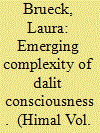

|
|
|
| 14 |
ID:
181337
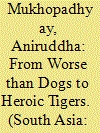

|
|
|
|
|
| Summary/Abstract |
Dalit autobiographies narrate the journey of protagonists from the ‘untouchable’ communities of India towards self-realisation and their struggle for human rights. A vigilant reading recognises the representation of animals as tropes in Dalit autobiographies that trace the reconstitution of the non-human limit of the Dalit as narrative subject. This paper reads Dalit autobiographies by Narendra Jadhav, Bama and Namdeo Nimgade to reveal the importance of animals as an analogy in Dalit literature, but then, following the work of Spivak and Derrida, it deconstructs the circulation of the hegemonic logic of the rational humanist subject in the radical gesture of Dalit subject constitution.
|
|
|
|
|
|
|
|
|
|
|
|
|
|
|
|
| 15 |
ID:
099926
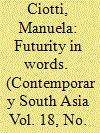

|
|
|
|
|
| Publication |
2010.
|
| Summary/Abstract |
Drawing on ethnographic fieldwork in Uttar Pradesh, this article explores low-caste women political activists' self-representation. Low-caste communities have been mobilised to supra-local ideologies that posit 'classic' forms of subalternity such as the Dalit condition - and the rights and entitlements attached to it - as their rallying symbols. This article offers a counter-intuitive example to expressions of the burgeoning Dalit identity in north Indian society. In particular, it shows resistance to the usage of the Dalit label for self-representation by a number of low-caste women activists within the Bahujan Samaj Party. From women's narratives it emerges that 'Dalit' - implying a caste-laden ontological condition of subalternity - is denied on the grounds of its disempowering connotations. These narratives are all the more salient in consideration of the layered structure of gendered, socio-economic, cultural and political marginalities that low-caste women usually experience. While these findings unearth the discrepancies between subaltern pasts and cultures vis-a-vis their appropriation by low-caste women in contemporary north Indian society, they also point to vernacular understandings of 'Dalit' in circulation in the Uttar Pradesh public sphere. Moreover, these findings point to the need to de-link caste identity from agency, and to ethnography as a tool to (re)construct their nexus. Finally, by foregrounding the historicity of the Dalit label, this article encourages reflection on its widespread use.
|
|
|
|
|
|
|
|
|
|
|
|
|
|
|
|
| 16 |
ID:
133569
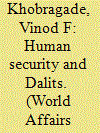

|
|
|
|
|
| Publication |
2014.
|
| Summary/Abstract |
Human security does not consist only of military defence, but rather focuses on the protection and well-being of human life and dignity. Vinod F Khobragade elucidates the context of human security in India in general and amongst Dalits in particular. He also questions India's credibility as a potential superpower given its poor performance on social indicators.
|
|
|
|
|
|
|
|
|
|
|
|
|
|
|
|
| 17 |
ID:
159392
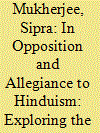

|
|
|
|
|
| Summary/Abstract |
The article studies the Bangla hagiography of Harichand Thakur, the founder of the Matua sampraday, a sect that broke away from Brahmanical Hinduism in nineteenth-century Bengal. The paper explores how the hagiography takes on the added task of constructing the collective identity of the Matuas. It argues that for a vulnerable and marginalised community where the hagiography is among the few books published, the text serves to validate the community's aspirations and authenticates its legacy. The sect, founded in opposition to the dominant Brahmanical hegemony that had kept them suppressed for generations, has been an upwardly mobile community in the twentieth century. The essay examines the changing presentations of the hagiography over a century to explore how the Matua community walks a fine line between opposition and allegiance to the majoritarian Hindu faith, and how the indeterminate boundaries between myth and history, fact and fiction, are used in this project of the community's self-construction.
|
|
|
|
|
|
|
|
|
|
|
|
|
|
|
|
| 18 |
ID:
170476
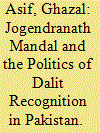

|
|
|
|
|
| Summary/Abstract |
This essay examines some turns in the Pakistani political career of the Dalit leader Jogendranath Mandal between 1947 and 1950 when he resigned as a government minister and left the country. The imperatives of Dalit emancipation interacted with concerns about the position of minorities, thereby revealing the conditions by which difference became legible in the new state. In the creation of Pakistan, Mandal had seen a promise of furthering Dalit emancipation, but this vision could not withstand the state’s view of an undifferentiated Hindu minority population. By tracing Mandal’s trajectory, this essay follows both the promises offered by Pakistan and the slow closure of such alternative possibilities.
|
|
|
|
|
|
|
|
|
|
|
|
|
|
|
|
| 19 |
ID:
119971
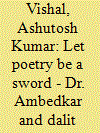

|
|
|
| 20 |
ID:
096070
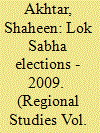

|
|
|
|
|
|
|
|